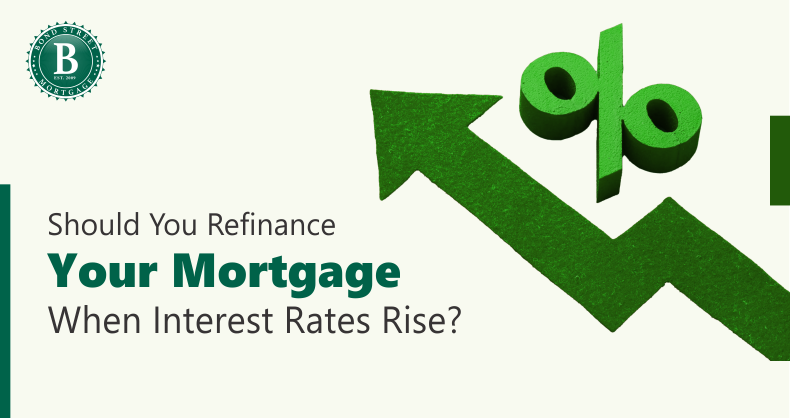
Refinancing a mortgage is a common decision to many as it reduces monthly payments, helps pay off loans faster, and enables one to tap home equity. Refinancing a mortgage is usually plausible for homeowners when interest rates are lower or stable.
However, one question often looms large in homeowners’ minds: Is it a good idea to refinance your mortgage when interest rates go up? Even when the interest rates are high, the interest rate of an old mortgage could be higher than the one currently offered.
Thus, refinancing a mortgage is a strategic move, but it’s crucial to understand the implications, advantages, and drawbacks of such a decision. This blog will illustrate the reasons why refinancing a mortgage in a rising interest-rate environment can be good for you.
Factors to Consider When Refinancing Your Mortgage
Before delving into whether you should refinance at high interest-rates, it is important to understand the various factors that can influence your decision:
Current Interest Rate Trends
The current trend in interest rates plays a significant role in the decision to refinance. If interest rates are rising, assessing whether they will continue to climb is essential.
Equity in Your Home
Accumulating equity in your home can be a game-changer. Suppose your home’s value has increased or you have made a significant payment towards your mortgage and reduced the outstanding balance by a considerable amount. In that case, you can refinance to access that equity for other financial goals.
Your Current Mortgage Terms
Analyze your existing mortgage terms, such as the interest rate, loan duration, and monthly payments. This will help you determine if refinancing is advantageous.
Your Credit Score
A good credit score can result in improved financial opportunities and refinancing offers. Assess your creditworthiness before making a decision.
Debt-to-Income Ratio
While the bar for credit scores can sometimes be high, lenders can also be stringent about the debt-to-income (DTI) ratios. 36% or less is the recommended DTI ratio.
Closing Costs
Consider the closing costs associated with refinancing. These expenses can impact the overall savings from a lower interest rate.
Pros and Cons Of Refinancing
Now let us take a look at the pros and cons of refinancing:
The Pros of Refinancing
Lower Monthly Payments
One of the most significant benefits of refinancing is the potential for lower monthly mortgage payments. This can free up funds for other essential expenses or savings.
Reduced Interest Costs
Refinancing at a lower interest rate can significantly reduce the total interest you pay over the life of your loan, saving you money in the long run.
Cash-Out Refinancing
With cash-out refinance, you can borrow more than your current mortgage balance and receive the difference in cash. You can use this for making home improvements, consolidating debt, or any other purpose.
The Cons of Refinancing
Closing Costs
Refinancing a mortgage typically involves incurring closing costs. These costs may include fees for application, appraisal, title search, attorney review, and other expenses. Considering these expenses when evaluating the potential benefits and drawbacks of refinancing is important.
Extended Loan Terms
Opting for a longer loan term while refinancing can lower monthly payments but may result in higher overall interest costs.
Economic Uncertainty
Interest rates fluctuate, and the economic climate is ever-changing. Refinancing during unfavorable times can lead to less advantageous terms.
Eligibility Criteria
Your credit score, income, and home equity determine your eligibility for refinancing. Not meeting certain criteria can hinder your ability to refinance.
Reasons Why You Should Refinance Your Mortgage at a Higher Interest Rate
Now, let us take a closer look at some of the reasons why you should consider refinancing at high-interest rates:
1.To Reduce Your Loan Term
Refinancing your mortgage is a good decision if your income has increased and you can pay off your loan faster. By doing so, you can avoid paying a high interest for a prolonged period and save a significant amount in the long run. For example, If your current mortgage loan term is 30 years, you can refinance to a shorter-term loan at a higher interest rate. As a result, the monthly payment can be higher, but you will be reducing the total interest costs eventually.
2.To Change from an ARM to a Fixed-Rate Mortgage
In contrast to fixed-rate mortgages, adjustable-rate mortgages or ARMs offer lower rates in the beginning. Over time, the interest rates increase and become higher than a fixed-rate mortgage owing to the periodic adjustments. In such a situation, transitioning to a fixed-rate mortgage not only lowers the interest rate but also helps you avoid any hikes in interest rates in the future.
3.Cash-Out Refinancing to Cover a Major Expense
Cash-out refinancing enables you to borrow more than your current mortgage balance and receive the surplus in cash. This extra cash can be used for various financial needs, such as home improvements or debt consolidation. Refinancing at a higher interest rate can also help you pay for your children’s education and enhance their employment opportunities consequently.
4.To Pay Off High-Interest Debts
Do you have quite a few high-interest debts? Then, refinancing your mortgage at a higher interest rate can be a wise move. By opting for cash-out refinance, your current mortgage rate is replaced with a new mortgage at a higher interest amount that you get paid in cash at closing. This surplus cash can consolidate your debt payments and other high-interest debts into monthly bills.
Credit cards, particularly, can have interest rates comparatively higher than mortgage interest rates in general. Hence, paying a higher interest for a mortgage refinance can still be a viable option if that interest rate is lower than the interest rates of other debts.
Before making this decision, evaluate the potential savings you will be achieving and remember to include the closing costs for refinancing that you might need to pay.
Conclusion
Deciding when to refinance your mortgage is a significant financial decision that can have long-term implications. It’s crucial to assess your unique situation, the market conditions, and financial goals. By making an informed choice, you can secure your financial well-being and take full advantage of mortgage refinancing opportunities.
Bond Street Mortgage stands out as a reputable and reliable mortgage lending firm. Our highly skilled and experienced professionals can provide you with the necessary assistance and help you find the right loan with the best interest rates. Contact us today for assistance.












